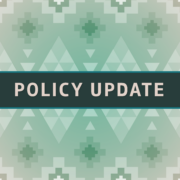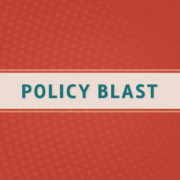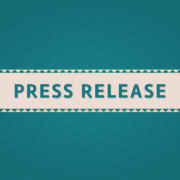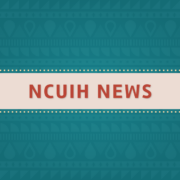NCUIH Resource: Tribal Nations Summit Briefing Book on Urban Indian Health Issues
On Novemeber 29, 2022, the National Council of Urban Indian Health (NCUIH) collaborated on the White House Tribal Nations Summit Briefing held by the National Indian Health Board (NIHB) and National Congress of American Indians (NCAI) for Indian Country leaders to prepare for the upcoming White House Tribal Nations Summit. As the organization that advocates for the health and well-being of urban Native Americans, NCUIH prepared a resource that highlights key priorities for urban Indian organizations (UIOs).
One of the main priorities for NCUIH is tribal sovereignty. The organization stands in strong support of consultation and the nation-to-nation relationships between Tribes and the United States government. NCUIH also supports the work of the Tribal Budget Formulation Workgroup, which crafts a budget request for Congress and the Administration each year. NCUIH also advocates for the US government to uphold the Declaration of National Indian Health Policy in the Indian Health Care Improvement Act. This policy states that it is the responsibility of the US government to ensure the highest possible health status for Indians and urban Indians and to provide the necessary resources to do so.
UIOs and urban Indians face unique challenges when it comes to access to healthcare. There are 41 UIOs that serve Indian Health Service beneficiaries at over 90 locations, but these organizations receive significantly less funding per patient than other healthcare facilities. On average, the health care spending in the US is $11,172 per person, while tribal and Indian Health Service (IHS) facilities receive only $4,078 per patient from the IHS budget. UIOs receive even less, at just $672 per patient.
Despite these challenges, UIOs serve a significant portion of the Native American population. Over 95% of UIO patients are tribal citizens, and over 70% of Native Americans do not live on federally recognized tribal land. NCUIH is advocating for 100% Federal Medical Assistance Percentage for UIOs to help address these disparities in healthcare access.
NCUIH is also advocating for advance appropriations for IHS— a top priority across Indian Country. The Indian healthcare system, including IHS, Tribal facilities, and UIOs, is the only major federal healthcare provider funded through annual appropriations and is not protected from government shutdowns and continuing resolutions. This policy is needed to save Native lives, as lapses in federal funding puts lives at risk. During the 2019 government shutdown, several UIOs had to reduce services or close their doors entirely, forcing them to leave their patients without adequate care which unfortunately led to fatalities. Advance appropriations is critical to provide certainty to the IHS system and ensure unrelated budget disagreements do not risk lives.
The Full Resource:
Urban Indian Health Issues
White House Tribal Nations Summit Briefing Book
National Council of Urban Indian Health (NCUIH)
- Tribal sovereignty is a top priority for the National Council of Urban Indian Health (NCUIH). We know all too well that the promises made to American Indians and Alaska Natives are often broken. NCUIH stands in strong support of Consultation and the Nation-to-Nation relationships of Tribes and the United States government.
- NCUIH strongly supports the work of the Tribal Budget Formulation Workgroup to craft a budget request for Congress and the Administration each year. NCUIH follows the guidance and requests of the Workgroup in its recommendations to Congress.
- NCUIH advocates for the US government to uphold the Declaration of National Indian Health Policy in the Indian Health Care Improvement Act: “Congress declares that it is the policy of this Nation, in fulfillment of its special trust responsibilities and legal obligations to Indians— to ensure the highest possible health status for Indians and urban Indians and to provide all resources necessary to effect that policy.”
Urban Indian Organizations and Urban Indians
- 41 Urban Indian Organizations serve IHS beneficiaries at over 90 locations
- The average health care spending in the United States is $11,172 per person, however, Tribal and Indian Health Service (IHS) facilities receive only $4,078 per American Indian/Alaska Native (AI/AN) patient from the IHS budget. Urban Indian Organizations (UIOs) receive just $672 per AI/AN patient from the IHS budget.
- 95% of Urban Indian Organization patients are Tribal citizens
- Over 70% of AI/AN citizens do not reside on Federally Recognized Tribal Land.
100% Federal Medical Assistance Percentage for Urban Indian Organizations
Background of 100% Federal Medical Assistance Percentage (FMAP) for UIOs:
- FMAP is the percentage of Medicaid costs covered by the federal government, through reimbursement to state Medicaid programs. As a baseline, FMAP cannot be less than 50% of the cost of services provided.
- In 1976, Congress passed the Indian Health Care Improvement Act (IHCIA) amended section 1905(b) of the Social Security Act to set the FMAP at 100% for Medicaid services “received through an Indian Health Service (IHS) facility whether operated by the Indian Health Service or by an Indian tribe or tribal organization.”
- Congress authorized 100% FMAP for IHS facilities so that Medicaid payments could supplement the chronically underfunded IHS annual appropriation and provide IHS with additional financial resources to better fulfill the federal government’s trust responsibility to provide safe and quality healthcare to American Indians/Alaska Natives (AI/ANs).
- Despite being an integral part of the Indian healthcare system, UIOs were overlooked in the original legislation authorizing 100% FMAP for IHS and Tribal healthcare providers. As a result, the federal government is not paying its fair share for Medicaid-IHS beneficiaries and is skirting the trust responsibility.
What is the issue?
- In March 2021, Congress authorized 8 fiscal quarters of 100% FMAP coverage for Medicaid services at UIOs for IHS beneficiaries through the American Rescue Plan Act of 2021 (ARPA).
- Since 2021, the federal government has been covering 100% match for IHS-Medicaid beneficiaries but starting on March, States will have to go back to paying for a portion of services received from IHS-Medicaid beneficiaries at UIOs.
- Congress needs to hear from Tribes that 100% FMAP provision for UIOs needs to be permanently authorized or at least extended to provide adequate care for tribal citizens living in urban areas.
How Tribes Can Support
- Create a resolution supporting permanent 100% FMAP for UIOs.
- Support 100% FMAP in Fiscal Year 2023 Omnibus bill.
- Contact your Members of Congress before it expires in 4 months to support an extension to the provision in the end-of-year Omnibus.
- If your Tribe is interested in supporting 100% FMAP for UIOs, please contact policy@ncuih.org
What Needs to be Done Now?
- Tell the Administration that the federal government must fulfill its trust responsibility for all IHS beneficiaries by making 100% FMAP permanent.
- The 100% FMAP provision for UIOs is going to expire in four months and the federal government will no longer be honoring its trust responsibility to IHS-Medicaid beneficiaries who receive care at urban Indian organizations.
- Congress needs to hear from Tribes that 100% FMAP provision for UIOs needs to be permanently authorized or at least extended to provide adequate care for tribal citizens living in urban areas.
What Tribes Can do to Support
If your Tribe is interested in supporting 100% FMAP for UIOs, please contact policy@ncuih.org
Tribal Support |
| ➤ Create a resolution supporting permanent 100% FMAP for UIOs. |
Congressional Advocacy |
➤ Support 100% FMAP in the Fiscal Year 2023 Omnibus bill.
|
Tribe and Tribal Organization Support for 100% FMAP for UIOs
- National Indian Health Board (NIHB)
- National Council of Urban Indian Health (NCUIH)
- National Congress of American Indians (NCAI)
- Affiliated Tribes of Northwest Indians
- Alaska Native Health Board
- Albuquerque Area Indian Health Board
- Association on American Indian Affairs
- California Rural Indian Health Board
- Great Lakes Area Tribal Health Board
- Great Plains Tribal Chairman’s Association
- Inter Tribal Association of Arizona
- Intertribal Agriculture Council
- Midwest Alliance of Sovereign Tribes
- National American Indian Housing Council
- National Association of Food Distribution Programs on Indian Reservations
- National Center for American Indian Enterprise Development
- National Indian Child Welfare Association
- National Indian Gaming Association
- Native Farm Bill Coalition
- Northwest Portland Area Indian Health Board
- Oneida Nation
- Self-Governance Communications and Education Tribal Consortium
- United South and Eastern Tribes Sovereignty Protection Fund
- United Tribes of Michigan
- Washoe Tribe of Nevada and California
Advance Appropriations
- Advance Appropriations One Pager
- Background on Advance Appropriations for IHS
- History of Legislation on Advance Appropriations for IHS
- Interactive Timeline
- Social Media Toolkit on Advance Appropriations
Advocacy
- On January 17, 2019, NCUIH sent a letter to the Vice Chairman of the Senate Committee on Indian Affairs, Tom Udall, in support of IHS advance appropriations legislation.
- On March 9, 2022, NCUIH joined NIHB and over 70 Tribal nations and national Indian organizations in sending a series of joint letters to Congress requesting advance appropriations for IHS in the Fiscal Year (FY) 2022 omnibus.
- On June 16, 2022, NIHB and NCAI requested that the Committee support and include IHS advance appropriations in the current FY 2023 appropriations bill in an action alert.
- On June 24, NCUIH issued a call to action to reach out to Speaker Pelosi for House support of advance appropriations.
- On June 24 and July 1, 2022, NCUIH sent a letters to Speaker Pelosi and House Minority Leader McCarthy to support advance appropriations for IHS.
- On June 29, 2022, NCUIH sent letters to the Senate Interior Appropriations Committee and the Senate Committee on Indian Affairs to support advance appropriations for IHS.
- On June 30 and July 1, 2022, NCUIH sent letters to Senate Majority Leader Schumer and Senate Minority Leader McConnell to support advance appropriations for IHS.
- On August 19, NCUIH issued a second call to action to reach out to Speaker Nancy Pelosi for House support of advance appropriations.
- On August 22, 2022, NCUIH launched a website with educational resources on advance appropriations.
- On October 26, 2022 NCUIH launched an advance appropriations social media campaign and toolkit with the hashtag #AdvanceIndianHealtht.
- On October 28, 2022, NCUIH released an advance appropriations advocacy toolkit.
- In November 2022, NCUIH signed-on to NIHB’s intertribal and inter-organization Congressional and White House letters requesting advance appropriations for the FY 2023.










Leave a Reply
Want to join the discussion?Feel free to contribute!